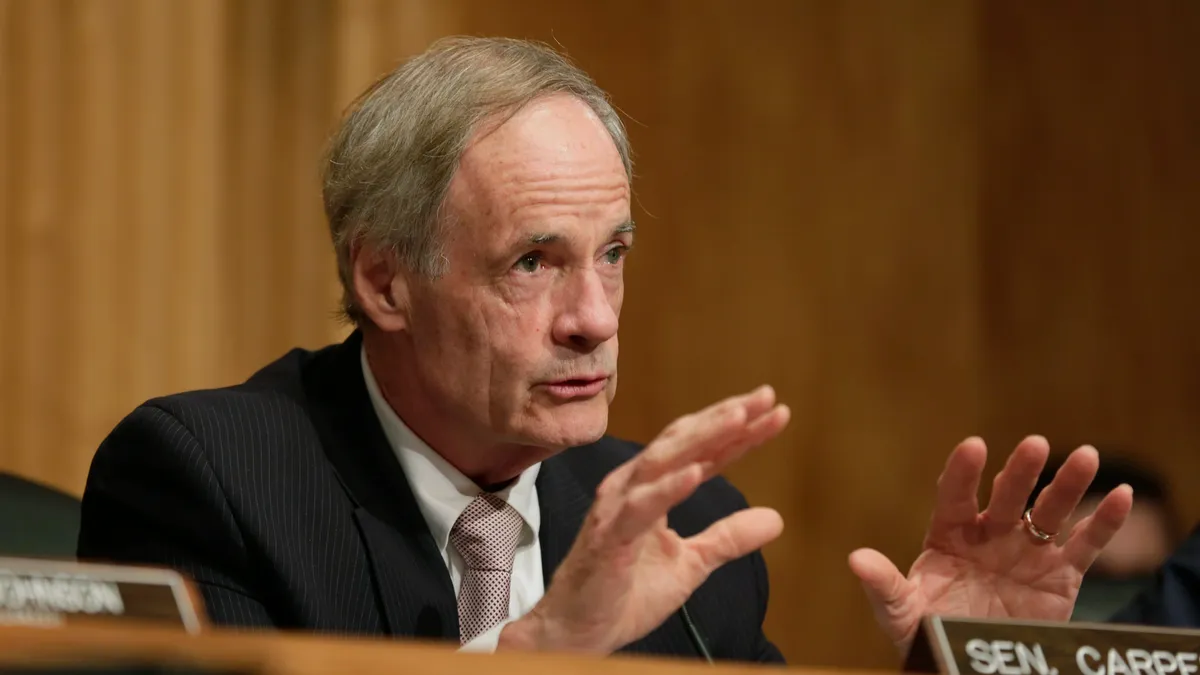Dive Brief:
- Sen. Tom Carper, D-Del., chairman of the Senate Environment and Public Works Committee, on Thursday unveiled an energy permitting reform proposal that includes a two-year limit on environmental reviews for some climate-focused projects.
- Carper’s proposal enters a crowded field: At least three other bills to update the federal permitting process for energy projects have been introduced in the Senate, and the House passed permitting reform legislation in March. Reform legislation proposed by Sen. Joe Manchin, D-W.Va., has support from President Joe Biden.
- The White House sketched out its priorities for permitting reform earlier this month and plans to update environmental review rules, but Republicans say they do not go far enough. “To truly modernize our environmental review and permitting processes we must actually amend the underlying statutes,” Sen. Shelley Moore Capito, R-W.Va., said at a Wednesday hearing on the issue.
Dive Insight:
There is broad agreement that the energy permitting process must be streamlined, but a key debate revolves around how environmental reviews are conducted.
The Clean Water Act, National Environmental Policy Act and Endangered Species Act need to be amended, Capito said, to give businesses more certainty. “We need enforceable deadlines on environmental reviews, not goals or soft, aspirational schedules,” she said. “Also, we need judicial reform to end the vicious cycle of projects being held in limbo by activists. We need lasting solutions that won't shift between administrations.”
Capito has proposed legislation to “modernize” NEPA, including provisions to require environmental impact statements to be completed within two years.
She cited the Mountain Valley Pipeline, a West Virginia gas project that is more than 90% built. “The red tape, regulatory hurdles and endless court battles faced by businesses slow and sometimes altogether stop critical projects,” Capito said at the hearing.
The legislation proposed by Manchin would ensure the pipeline is built and also includes a two-year limit for NEPA reviews for major projects.
Around 200 projects a year require an environmental impact statement, Carper noted at Wednesday’s hearing. “We can improve certainty, and we can improve predictability in the permitting process,” he said. But some of the proposed reforms set up a “false choice” between oversight and advancing projects, he said.
“If enacted, they may well strip away bedrock environmental protections ... and some of them would curtail or in certain cases outright eliminate the ability to seek judicial review of agency decisions,” Carper said.
“I think there are a number of good ideas from the Biden administration's proposal that could be, maybe should be, part of permitting reform legislation,” he said.
Among them is expanding the use of programmatic environmental reviews, he said, which some agencies have already embraced. Programmatic reviews consider the impacts of broad proposals or policies, as opposed to a project-level review.
“Off the coast of New York state, the use of programmatic environmental impact statements is helping to create a record of the environmental impacts of offshore wind development,” he said.
Carper released his own permitting legislation proposal on Thursday. It backs a two-year timeline for “climate change mitigation or resilience projects,” though not for fossil fuel projects.
The Council on Environmental Quality, which oversees NEPA implementation, is planning to propose a rule to “reform and update” the regulations implementing the law, CEQ Chair Brenda Mallory told the committee.
“We are planning a broad public engagement process to ensure that the regulations will achieve better outcomes for our communities and our environment,” she said. “As we implement these measures, we will continue to evaluate permitting reform proposals to assess their potential to improve the speed and quality of processes for big transformative projects.”















